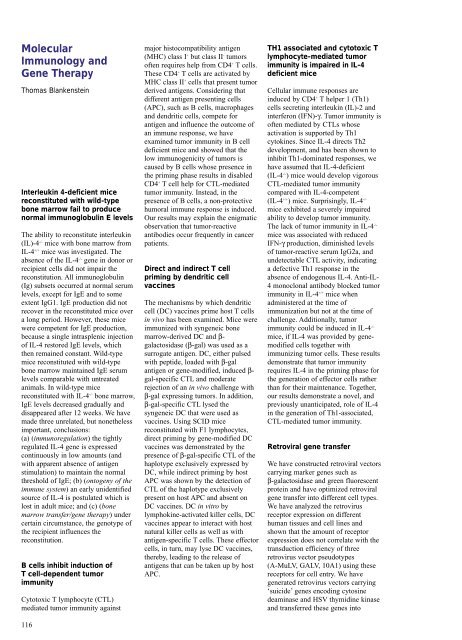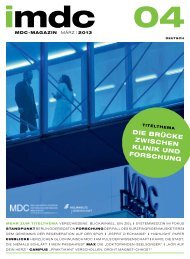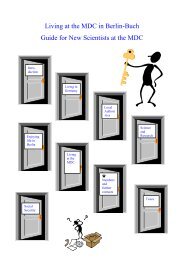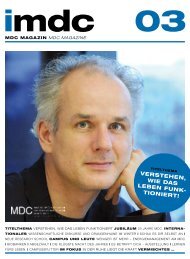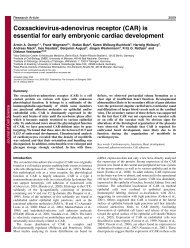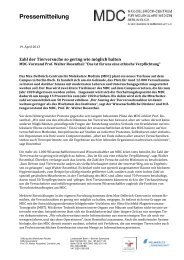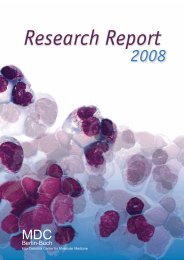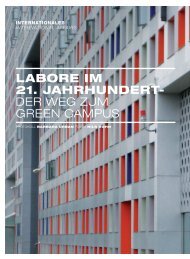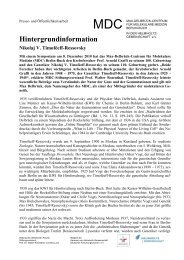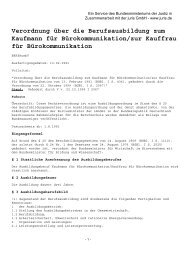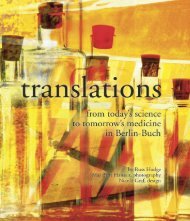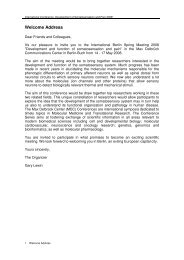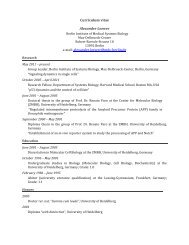Create successful ePaper yourself
Turn your PDF publications into a flip-book with our unique Google optimized e-Paper software.
Molecular<br />
Immunology and<br />
Gene Therapy<br />
Thomas Blankenstein<br />
Interleukin 4-deficient mice<br />
reconstituted with wild-type<br />
bone marrow fail to produce<br />
normal immunoglobulin E levels<br />
The ability to reconstitute interleukin<br />
(IL)-4 -/- mice with bone marrow from<br />
IL-4 +/+ mice was investigated. The<br />
absence of the IL-4 -/- gene in donor or<br />
recipient cells did not impair the<br />
reconstitution. All immunoglobulin<br />
(Ig) subsets occurred at normal serum<br />
levels, except for IgE and to some<br />
extent IgG1. IgE production did not<br />
recover in the reconstituted mice over<br />
a long period. However, these mice<br />
were competent for IgE production,<br />
because a single intrasplenic injection<br />
of IL-4 restored IgE levels, which<br />
then remained constant. Wild-type<br />
mice reconstituted with wild-type<br />
bone marrow maintained IgE serum<br />
levels comparable with untreated<br />
animals. In wild-type mice<br />
reconstituted with IL-4 -/- bone marrow,<br />
IgE levels decreased gradually and<br />
disappeared after 12 weeks. We have<br />
made three unrelated, but nonetheless<br />
important, conclusions:<br />
(a) (immunoregulation) the tightly<br />
regulated IL-4 gene is expressed<br />
continuously in low amounts (and<br />
with apparent absence of antigen<br />
stimulation) to maintain the normal<br />
threshold of IgE; (b) (ontogeny of the<br />
immune system) an early unidentified<br />
source of IL-4 is postulated which is<br />
lost in adult mice; and (c) (bone<br />
marrow transfer/gene therapy) under<br />
certain circumstance, the genotype of<br />
the recipient influences the<br />
reconstitution.<br />
B cells inhibit induction of<br />
T cell-dependent tumor<br />
immunity<br />
Cytotoxic T lymphocyte (CTL)<br />
mediated tumor immunity against<br />
116<br />
major histocompatibility antigen<br />
(MHC) class I + but class II - tumors<br />
often requires help from CD4 + T cells.<br />
These CD4 + T cells are activated by<br />
MHC class II + cells that present tumor<br />
derived antigens. Considering that<br />
different antigen presenting cells<br />
(APC), such as B cells, macrophages<br />
and dendritic cells, compete for<br />
antigen and influence the outcome of<br />
an immune response, we have<br />
examined tumor immunity in B cell<br />
deficient mice and showed that the<br />
low immunogenicity of tumors is<br />
caused by B cells whose presence in<br />
the priming phase results in disabled<br />
CD4 + T cell help for CTL-mediated<br />
tumor immunity. Instead, in the<br />
presence of B cells, a non-protective<br />
humoral immune response is induced.<br />
Our results may explain the enigmatic<br />
observation that tumor-reactive<br />
antibodies occur frequently in cancer<br />
patients.<br />
Direct and indirect T cell<br />
priming by dendritic cell<br />
vaccines<br />
The mechanisms by which dendritic<br />
cell (DC) vaccines prime host T cells<br />
in vivo has been examined. Mice were<br />
immunized with syngeneic bone<br />
marrow-derived DC and βgalactosidase<br />
(β-gal) was used as a<br />
surrogate antigen. DC, either pulsed<br />
with peptide, loaded with β-gal<br />
antigen or gene-modified, induced βgal-specific<br />
CTL and moderate<br />
rejection of an in vivo challenge with<br />
β-gal expressing tumors. In addition,<br />
β-gal-specific CTL lysed the<br />
syngeneic DC that were used as<br />
vaccines. Using SCID mice<br />
reconstituted with F1 lymphocytes,<br />
direct priming by gene-modified DC<br />
vaccines was demonstrated by the<br />
presence of β-gal-specific CTL of the<br />
haplotype exclusively expressed by<br />
DC, while indirect priming by host<br />
APC was shown by the detection of<br />
CTL of the haplotype exclusively<br />
present on host APC and absent on<br />
DC vaccines. DC in vitro by<br />
lymphokine-activated killer cells, DC<br />
vaccines appear to interact with host<br />
natural killer cells as well as with<br />
antigen-specific T cells. These effector<br />
cells, in turn, may lyse DC vaccines,<br />
thereby, leading to the release of<br />
antigens that can be taken up by host<br />
APC.<br />
TH1 associated and cytotoxic T<br />
lymphocyte-mediated tumor<br />
immunity is impaired in IL-4<br />
deficient mice<br />
Cellular immune responses are<br />
induced by CD4 + T helper 1 (Th1)<br />
cells secreting interleukin (IL)-2 and<br />
interferon (IFN)-γ. Tumor immunity is<br />
often mediated by CTLs whose<br />
activation is supported by Th1<br />
cytokines. Since IL-4 directs Th2<br />
development, and has been shown to<br />
inhibit Th1-dominated responses, we<br />
have assumed that IL-4-deficient<br />
(IL-4 -/- ) mice would develop vigorous<br />
CTL-mediated tumor immunity<br />
compared with IL-4-competent<br />
(IL-4 +/+ ) mice. Surprisingly, IL-4 -/mice<br />
exhibited a severely impaired<br />
ability to develop tumor immunity.<br />
The lack of tumor immunity in IL-4 -/mice<br />
was associated with reduced<br />
IFN-γ production, diminished levels<br />
of tumor-reactive serum IgG2a, and<br />
undetectable CTL activity, indicating<br />
a defective Th1 response in the<br />
absence of endogenous IL-4. Anti-IL-<br />
4 monoclonal antibody blocked tumor<br />
immunity in IL-4 +/+ mice when<br />
administered at the time of<br />
immunization but not at the time of<br />
challenge. Additionally, tumor<br />
immunity could be induced in IL-4 -/mice,<br />
if IL-4 was provided by genemodified<br />
cells together with<br />
immunizing tumor cells. These results<br />
demonstrate that tumor immunity<br />
requires IL-4 in the priming phase for<br />
the generation of effector cells rather<br />
than for their maintenance. Together,<br />
our results demonstrate a novel, and<br />
previously unanticipated, role of IL-4<br />
in the generation of Th1-associated,<br />
CTL-mediated tumor immunity.<br />
Retroviral gene transfer<br />
We have constructed retroviral vectors<br />
carrying marker genes such as<br />
β-galactosidase and green fluorescent<br />
protein and have optimized retroviral<br />
gene transfer into different cell types.<br />
We have analyzed the retrovirus<br />
receptor expression on different<br />
human tissues and cell lines and<br />
shown that the amount of receptor<br />
expression does not correlate with the<br />
transduction efficiency of three<br />
retrovirus vector pseudotypes<br />
(A-MuLV, GALV, 10A1) using these<br />
receptors for cell entry. We have<br />
generated retrovirus vectors carrying<br />
‘suicide’ genes encoding cytosine<br />
deaminase and HSV thymidine kinase<br />
and transferred these genes into


